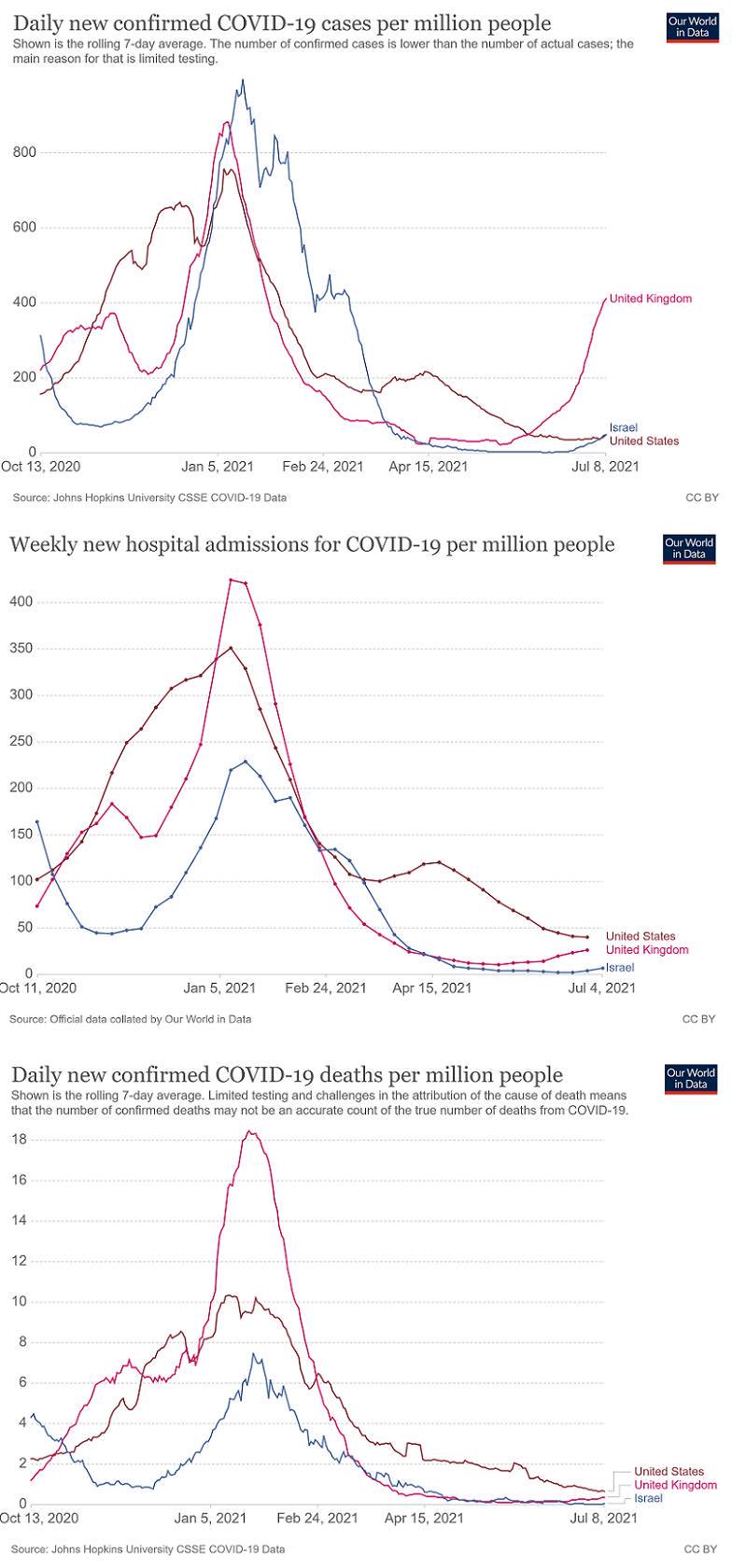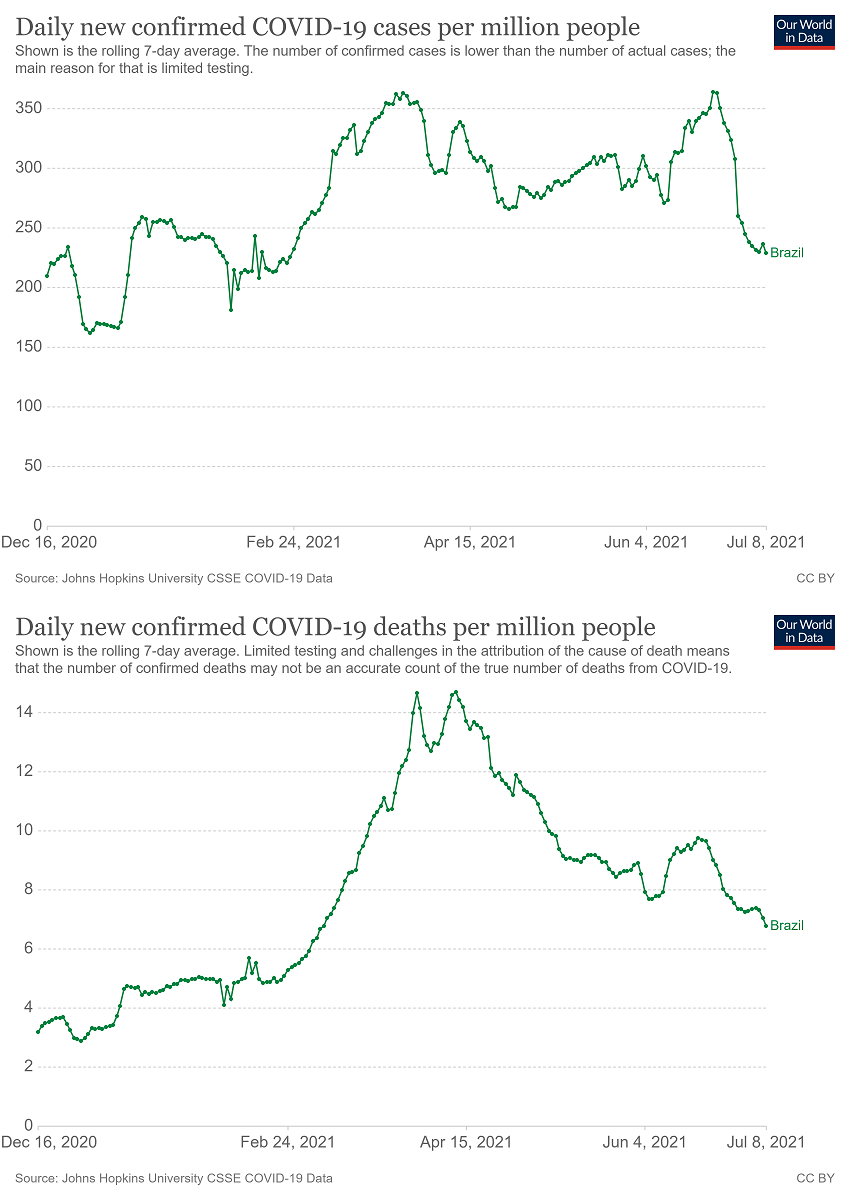Ministry of Health data shows that 18.6% of Brazilians over the age of 18 have completed the vaccination schedule by Friday (9)
In just over a year into the spread of the Covid-19 pandemic, Brazil and the world have always seen an increase in the curve of new cases of the disease with patients in serious condition and deaths in the following weeks.
But experts say where Vaccination is already in an advanced stageThe scenario begins to change. For them, although there is an increase in the number of cases, the trend is that this does not translate into an increase, in the same proportion, in ICU admissions and deaths.
 Vaccination against COVID-19 – Photo: Camila Batista / Simsa / Public Photos
Vaccination against COVID-19 – Photo: Camila Batista / Simsa / Public PhotosSuch behavior has already been observed in countries in the UK and Israel, for example, where more than half of the population has been vaccinated (see graphs below).
Data from the Ministry of Health shows that as of Friday (9), 18.6% of Brazilians over the age of 18 have completed the vaccination schedule. 51.8% took the first dose.
Accelerated Professor Jose de Albuquerque Luna, from the University of São Paulo Medical School and from the field of epidemiology and infectious disease control at the Institute of Tropical Medicine in São Paulo, highlights the example of England, which has already done so. It reached 51% of the population with both doses.
They have already advanced in vaccination. It has been shown that there is a recurrence of infection, although it is rare, and cases also occur in vaccinated people. However, vaccination has been effective – the ability to protect people – mainly for hospitalization, that is, for serious cases and deaths,” he explains.
Is this repeated in Brazil?
In the assessment of Diego Xavier, physician in public health and researcher at the Covid-19 Observatory in Viecruz (Oswaldo Cruz Foundation), when analyzing graphs of new cases and deaths, it is already possible to see a disconnect from this chronological relationship that exists in Brazil.
Despite the downward trend in deaths from the second half of April onwards, cases are still very high from the second half of April onwards. This indicates a disconnect between the incidence of cases and the occurrence of serious cases and deaths. Most likely, it is already the effect of vaccination that is taking place,” he says.
Eliseo Waldman, MD, a physician and professor in the Department of Epidemiology at the University of the South Pacific School of Public Health, points out that immunizing agents work precisely at what was their primary goal: to prevent serious cases and deaths.
What’s happening is that vaccines have been able to make the cases where they fail, say, less severe, in terms of preventing disease. The individual develops the disease, often a milder condition, and does not go into hospital. And if they are hospitalized, they go to the intensive care unit less and there are fewer deaths. This appears to be the behavior, at least for the past few months. [em outros países]. And here in Brazil, it is at a much worse level, but from April onwards”, he highlights.
However, the Vuecruz researcher warns: “The moving average that we’re observing today in Brazil, in terms of cases and deaths, is much higher than anything we’ve seen in 2020.”
Thus, the risk to Brazilians in the face of the epidemic, even for those who have been vaccinated, continues until a significant decrease in new cases is observed, the expert guarantees. There is even a risk of new variants emerging.
Professor Expedto Luna, of the University of the South Pacific School of Medicine, claims that Brazil has failed to control transmission and points to another factor to consider.
“In Brazil and in countries with younger populations, we have to take into account that the proportion of young people is greater than the elderly population. So, if we cannot control transmission and vaccination is still too slow for young people, there will be many cases. Because there are many Of the cases, some will get worse, some will develop into gravity and some will unfortunately die. It was necessary to have an investment in transmission control, and Brazil failed shamefully in this regard,” he asserts.
Delta variable, a component that can make it difficult
The spread of the delta type of coronavirus (first identified in India), which is the most transmissible, increases infection curves in countries where vaccination has developed rapidly, yet deaths have been concentrated among the unvaccinated.
The Director of the Center for Disease Control and Prevention (CDC), Rochelle Walinsky, said last Thursday (8), that 99.5% of deaths from Covid-19 occurred in the country in recent months to individuals who were not vaccinated.
“In simple words: In areas with low vaccination coverage, cases and hospitalizations are increasing,” Rochelle stressed, saying that the delta variant is already prevalent in the United States.
The US government is facing resistance from residents of some states to join the vaccination campaign. An estimated 93 percent of new cases in recent days have occurred in counties with immunization rates below 40 percent.
The director of the CDC said that the spread of the delta variant is especially dangerous for young people. Research by the agency indicates that it may cause more serious illness among young people than other variants of the coronavirus.
The São Paulo government considers that there is community transmission of this variant in the state, given that a resident with a delta strain has no history of traveling abroad. Across the country, there are 16 confirmed cases by genetic analysis.
Expected second dose?
Epidemiologist and Professor at Ufes (Federal University of Espirito Santo) Ethel Maciel says that the increased use of vaccines with a high degree of protection in the first dose (Pfizer, AstraZeneca, Janssen), from mid-June onwards, decreased the number of hospitalizations and deaths due to Covid-19 in Brazil.
However, she advocates having adjustments in the interval between doses if there is a wide prevalence of the delta variant in the country.
“With this new alternative, it is very important that we have a complete two-dose schedule of our two-dose vaccines,” he says, suggesting shortening the period between doses of AstraZeneca from 12 to 8 weeks and Pfizer to 21 days, as stipulated in the package supplement. The Ministry of Health is currently adopting a 12-week period.
Zero risk of dying from covid?
What many are wondering with the development of vaccination in Brazil is when normal life will return to reality. For Waldmann, caution is essential when resuming activities.
“I think it’s back to the new normal, and we won’t have the conditions of coexistence we had before the pandemic. Even those who have been vaccinated will still have to be careful because, of course, everything indicates that there is a decrease in the severity of cases, but there are always people , because of the common disease or some specific characteristic of it, it happens in this way. So, deaths will continue to occur, but at a lower level,” he warns.
In countries with good vaccination coverage, deaths from COVID-19 among those vaccinated are common. It won’t be any different in Brazil, but the number of deaths will be “much less than what has been seen so far,” says Diego Xavier, of Vuecruz.
There is a lot of talk about deaths among vaccinated people in Israel. We expect all deaths occurring within one year to be vaccinated. Remember that no vaccine is 100%. To have a 100% chance of not dying from the coronavirus, you just don’t get sick. Even among those who have been vaccinated, there is a margin of confidence there for the vaccine. The number of people dying in Israel is much lower than it was before vaccination,” he explains.
Moreover, there will always be a part of the population that has not been vaccinated. At the moment, they are children and teenagers, but there are also those who choose not to get vaccinated.
“In the United States, of the population over the age of 18, 55% have already taken one dose and 47% have taken two doses. You have that whole population that is not yet vaccinated and under the age of 18. Children and teens have less serious disease. , but the virus continues to spread among them. This puts at risk mainly deniers, adults and the elderly who decide not to get vaccinated,” concludes Expedito Luna, of the University of the South Pacific.

“Wannabe internet buff. Future teen idol. Hardcore zombie guru. Gamer. Avid creator. Entrepreneur. Bacon ninja.”



